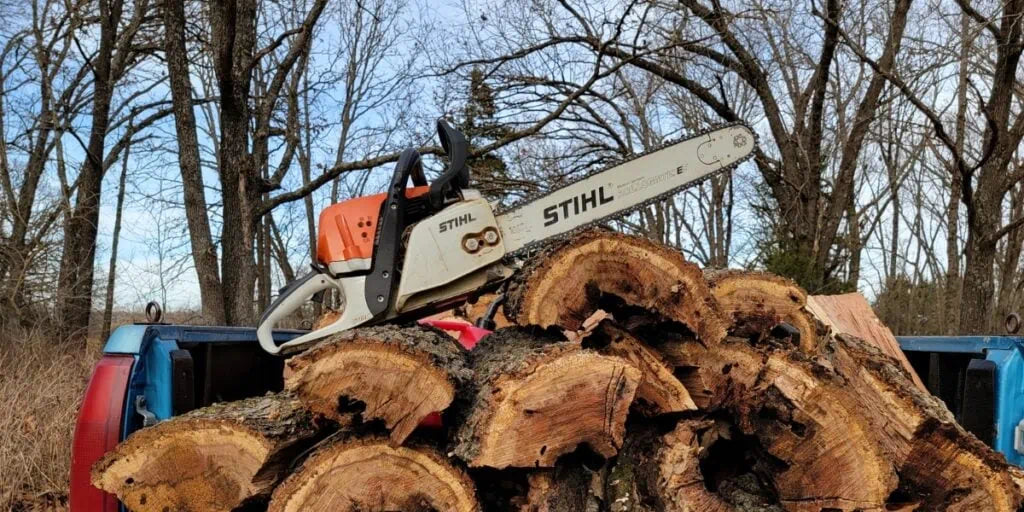What Is A Chainsaw?
A chainsaw is a powerful tool that can be used for all kinds of tasks, from cutting down trees to pruning branches. It’s like having your own personal lumberjack in the backyard! With its roaring engine and rotating blade, it has an intimidating presence that should not be taken lightly.
Chainsaws are incredibly dangerous pieces of machinery; they require proper training before use, as well as regular maintenance checks by qualified professionals to ensure safe operation. Even when handled correctly, accidents do happen – so ensuring that your chainsaw remains in top condition at all times is essential for safety and efficiency.
What Are The Benefits Of Professional Maintenance?
Having a chainsaw maintained by a professional is essential for ensuring that the tool works optimally and safely. Professional maintenance offers many benefits, from preventing costly repairs to keeping users safe from harm.
One of the main reasons it’s important to have your chainsaw serviced regularly by an experienced technician is to prevent major damage or malfunctioning parts in the future. Having regular service checks can help identify any issues with the machine before they become more serious and expensive problems. Additionally, professionals will clean and lubricate moving parts on the saw, which helps maximize its efficiency and lifespan. Furthermore, since technicians are well-versed in how these tools work, they can offer valuable advice about proper usage techniques so you know how to use your chainsaw properly and avoid potential accidents that could otherwise result in injury or property damage.
Common Maintenance Issues
Regular maintenance of your chainsaw is essential for its proper functioning. Chainsaws can be difficult to maintain, and it’s important to seek professional help when needed. Common issues that arise with a neglected saw include: clogged air filters, dull or damaged blades, and worn chain-bar rails. Clogged air filters are the most common problem, as they keep debris from entering the engine but can become blocked if not regularly cleaned. Dull or damaged blades create an uneven cut which compromises the quality of work produced by the chainsaw. Worn chain-bar rails can cause binding during cutting operations and should be checked frequently to ensure safety while operating the saw.
To prevent any of these issues from occurring in the first place, regular cleaning and oiling should take place according to manufacturer instructions. Properly sharpened blades will also ensure that cuts made by the saw are smooth and accurate every time. In addition, all moving parts of the chainsaw should be inspected regularly for signs of wear or damage before each use.
Checking The Chain Tension
The tension of the chain is essential for a properly functioning chainsaw – it’s like the lifeblood of your machine. Symbolically, this could be compared to having just enough slack in our lives between work and leisure; too much or too little stress can cause us to break down. Keeping an optimal level of tension on the chain requires regular maintenance from a professional.
Cleaning And Lubrication Processes
Cleaning is essential for any engine-powered tool. Removing dirt and debris from internal areas helps prevent build up that can lead to breakdowns. It also removes dust and other particles which interfere with the operation of the machine’s components. Lubrication ensures all moving parts move smoothly by reducing friction between them. This prevents wear on metal surfaces as well as reduces heat buildup due to constant motion. Both processes are necessary to keep your saw functioning properly and avoid costly repairs down the line. Therefore, having your chainsaw professionally serviced is highly recommended once a year at minimum – especially during periods of intense use or when working in dusty environments.
Sharpening The Chain And Bar
One key element to maintaining a chainsaw is sharpening the chain and bar regularly. Properly sharpened blades make it easier to cut wood, while dull blades can cause kickback or binding in the tree trunk, which could result in injury or worse. If you sharpen your own saws, you should use a file guide to ensure that each tooth is exactly the same length as the others so that they all cut evenly. An angle gauge should also be used to ensure that the angles of the teeth are correct for efficient cutting. It’s important to note that if you don’t feel confident enough to do this yourself, then it’s best to leave it up to a professional who knows how to safely sharpen a blade properly.
A professional will be able to inspect your chain and bar for any wear and tear before sharpening them; worn parts may need replacing instead of just being sharpened. They’ll also check for signs of damage such as chips, dents or cracks on both components. Leaving these issues unaddressed can not only create an unsafe situation but can lead to further damage down the line due solely to improper maintenance earlier on.
Balancing The Saw
The first step to balancing a chainsaw is to check the tension on the chain. If it’s too loose, then you’ll need to adjust the tensioning screw until the correct level of tension has been achieved. Next, inspect the depth gauge settings on each drive link of the chain; they should be set at one hundredth of an inch above factory specifications for optimal performance and safety. Finally, make sure that all components are securely fastened together so there’s no slippage or rattling when running your saw.
Other Parts To Inspect
There are other parts of a chainsaw that should be inspected by a professional. The air filter should be checked for dirt build-up or debris obstructing its normal operation. If it’s clogged up, this will reduce power output and cause the engine to run hot. It’s also important to check the spark plug for any signs of wear or damage. A malfunctioning spark plug can prevent proper combustion in the engine and lead to performance issues.
The fuel system should also receive regular maintenance from a professional. This includes checking all fluid levels, replacing dirty filters, ensuring hoses aren’t cracked or leaking, and examining any gaskets for potential leaks. All these components must work together correctly in order for your saw to perform at its peak efficiency.
What Are The Common Signs That A Chainsaw Needs To Be Serviced?
First off, if your chainsaw starts smoking more than usual or its motor begins running louder than normal then that could very well be an indication that something isn’t quite right. Additionally, if the chain has become dull or won’t stay in line with the bar anymore then this should also raise alarm bells. Other common signs include difficulty starting up the engine, leaking fluids from the tank or even excessive vibrations during operation which often indicates misalignment within the internal workings of the saw.
All these situations require immediate attention as any delay can result in costly repairs further down the road. So make sure to keep an eye on all these warning signals and take your chainsaw into a shop whenever you notice them – trust us, your wallet will thank you later!
When To Call A Professional Service Provider
It’s important to know when it’s time to call a professional service provider for help with your chainsaw. If you ever experience any difficulty starting the saw, or if it begins running roughly, then it’s definitely time to find an expert who can look at it and determine what needs to be done. In addition, after each use of your chainsaw, make sure that you inspect it closely; this will allow you to spot minor issues before they become big problems that require costly repairs.
If in doubt about anything regarding your chainsaw’s condition or performance, don’t hesitate to contact a professional service provider. They are experienced in dealing with all types of repair situations involving chainsaws and can provide valuable advice on how best to keep yours running smoothly. A well-maintained chainsaw is essential for safe operation and reliable results – so always trust the experts!
Conclusion
Having your chainsaw regularly maintained by a professional is essential for its proper functioning and safety. It’s important to remember that it costs money up front, but this will save you from costly repairs down the road; in fact, one study found that DIY maintenance can lead to more than double the cost of any repair compared to having it serviced professionally.
It’s also important to be aware of when your chainsaw needs servicing. Common signs include unusual noises or vibrations during use, difficulty starting the saw, and an increase in smoke coming out of the exhaust port. If you notice any of these symptoms, then get it serviced immediately!
At the end of the day, there are many advantages to having your chainsaw maintained by a professional: you’ll have peace of mind knowing that it’s safe and well-maintained, as well as saving yourself time and money with potential repairs down the line. So make sure you take care of your chainsaw – after all, it will take care of you!
At ProCore Power Equipment, we have the knowledge, skills and equipment to make sure your chainsaw is properly sharpened and maintained. Learn more about our services here.

